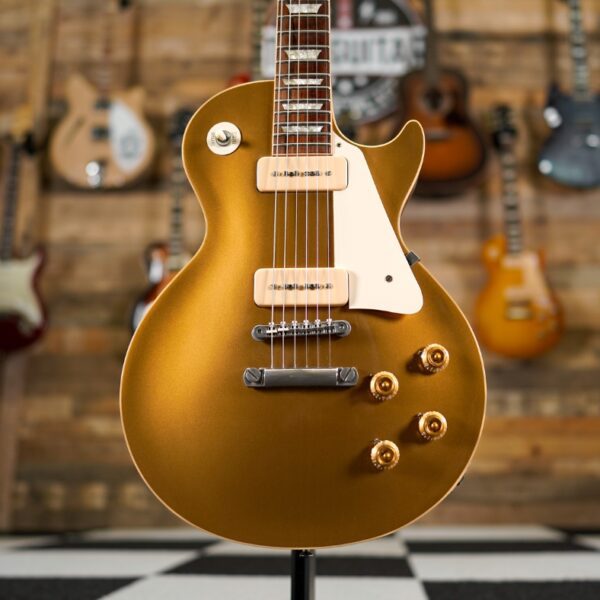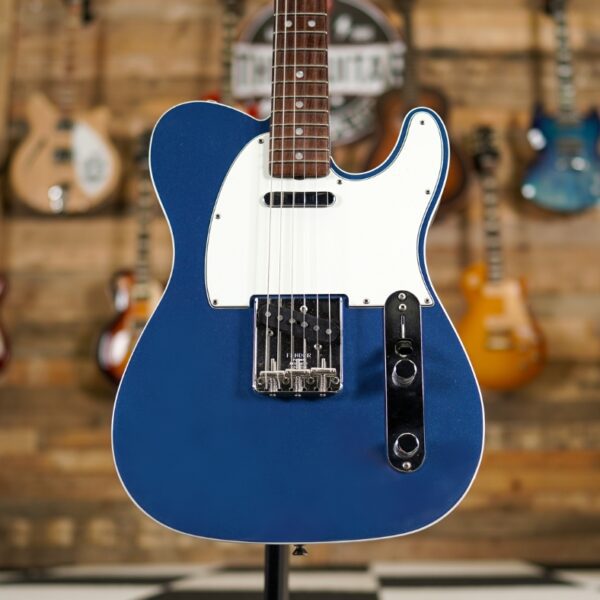April 26, 2023 | Posted in Guitar Tips & Tricks

Playing guitar can be one of the most rewarding and enjoyable experiences, but it takes time and effort to achieve the desired results. From tuning to choosing the right accessories, every aspect of guitar playing contributes to the overall experience. However, one aspect that is often overlooked but is essential to achieving a great sound is the choice of guitar strings.
Guitar strings are the primary source of sound on an acoustic or electric guitar. They are responsible for creating vibrations that resonate through the instrument’s body, producing the sound that we hear. However, not all guitar strings are created equal, and choosing the right set can make a significant difference in the tone, playability, and overall feel of the guitar.
With so many different types of guitar strings available, it can be overwhelming to decide which set to choose. Factors such as gauge, material, tone, and playability all play a role in the decision-making process. Additionally, different playing styles require specific types of strings to achieve the desired sound and feel.
In this blog post:
we will explore everything you need to know about choosing the right guitar strings. We’ll cover the different types of guitar strings available, including steel, nylon, and coated strings, and discuss the pros and cons of each. We’ll also delve into the various factors to consider when choosing guitar strings, such as gauge, material, tone, and playability.
Moreover, we’ll examine how different playing styles can affect the choice of guitar strings. From blues to rock to country and classical, each genre requires a unique sound and feel that can be achieved by choosing the right set of strings. We’ll offer recommendations and tips for different playing styles to help you find the perfect set of strings for your needs.
Additionally, we’ll provide tips for maintaining your guitar strings to ensure they stay in good condition and last longer. Simple measures such as cleaning and changing strings regularly can make a significant difference in the overall sound and feel of your guitar.
Choosing the right guitar strings can make a significant difference in the overall sound and playability of your guitar. By considering factors such as gauge, material, tone, and playability, and understanding how different playing styles can affect the choice of strings, you can find the perfect set of strings for your needs. Moreover, proper maintenance can help ensure that your guitar strings stay in good condition and continue to produce a great sound. So, let’s dive in and explore the world of guitar strings!

Types of Guitar Strings: Introducing different uses.
In this section of the blog post, we will delve into the different types available, including steel, nylon, and coated. Each type of string has its own unique characteristics, and understanding the differences between them can help you make an informed decision when choosing the right set for your guitar.
Steel strings are the most commonly used type of guitar strings and are typically used on acoustic and electric guitars. They produce a bright and crisp sound, making them ideal for genres such as rock, blues, and country. Steel strings are available in different gauges, with the thinner gauges producing a brighter sound and the thicker gauges producing a warmer and fuller sound.
Nylon strings, on the other hand, are commonly used on classical and flamenco guitars. They produce a warm and mellow sound, making them ideal for genres such as classical, Spanish, and Latin music. Nylon strings are available in different tensions, with the higher tensions producing a louder and brighter sound and the lower tensions producing a softer and warmer sound.
Coated strings are a newer type of guitar string that has gained popularity in recent years. They are made of a core wire that is coated with a thin layer of polymer, which helps to protect the string from dirt, sweat, and other elements that can cause corrosion. Coated strings last longer than traditional strings and maintain their bright and crisp sound for a more extended period. However, they can be more expensive than traditional strings.
Another factor to consider when choosing guitar strings is the material they are made of. Steel strings are typically made of either stainless steel or nickel-plated steel, with nickel-plated steel being the more popular choice. Nylon strings are made of nylon, while coated strings can be made of various materials such as nickel, phosphor bronze, or titanium.
The material of the guitar strings can also affect the tone and playability of the guitar. For example, nickel-plated steel strings produce a brighter sound than stainless steel strings, while phosphor bronze strings produce a warmer and more resonant sound.
The type of guitar string can make a significant difference in the overall sound and playability of your guitar. Steel strings are ideal for genres such as rock, blues, and country, while nylon strings are more suited to classical and flamenco music. Coated strings are a newer type of string that offers longer-lasting durability and a bright, crisp sound. The material, such as nickel-plated steel, stainless steel, or phosphor bronze, can also affect the tone and playability of the guitar. Understanding these differences can help you make an informed decision when choosing the right set for your needs.
Factors to Consider When Purchasing Guitar Strings:

In this section of the blog post, we will discuss the various factors to consider when choosing guitar strings, such as gauge, material, tone, and playability. These factors can affect the overall sound, feel, and playability of your guitar, and understanding them can help you make an informed decision when selecting the right set of strings.
Gauge refers to the thickness of the guitar strings. The thickness of the strings can affect the tone and playability of the guitar. Thicker strings produce a fuller and warmer sound, while thinner strings produce a brighter and more delicate sound. However, thicker strings can be more challenging to play and may require more finger pressure, while thinner strings are easier to play but may break more easily.
Material is another essential factor to consider when choosing guitar strings. As we discussed in the previous section, different materials, such as steel or nylon, can affect the tone and playability of the guitar. In addition, different brands of strings can use different materials, resulting in variations in tone and playability.
Tone is another crucial factor to consider when choosing guitar strings. Tone refers to the overall sound produced by the strings. The tone of the strings can be affected by factors such as the material, gauge, and tension of the strings. It’s essential to choose strings that produce the tone you desire for the genre of music you are playing.
Playability refers to how easy it is to play the guitar strings. Thicker strings can be more challenging to play and may require more finger pressure, while thinner strings are easier to play but may break more easily. Some guitar strings are designed for specific playing styles, such as fingerpicking or strumming, and can affect the overall playability.
In addition to these factors, it’s important to consider your playing style when choosing guitar strings. Different playing styles, such as fingerpicking or strumming, require different types of strings to achieve the desired sound and feel. For example, fingerpicking may require lighter gauge strings, while strumming may require heavier gauge strings.
Finally, it’s important to consider your budget when choosing guitar strings. While some strings can be more expensive, they may offer longer-lasting durability and better tone. However, there are also more affordable options available that can still offer decent sound and playability.
String Maintenance:
Now we will discuss the importance of changing strings regularly. Over time, they can lose their tone and playability, making them more difficult to play and producing a duller sound. Changing your guitar strings regularly can help to maintain the sound and playability of your instrument.
The frequency of swapping them out depends on several factors, such as how often you play your guitar and the type of strings you use. As a general rule, it’s recommended to change your guitar strings every three to six months if you play regularly. If you play your guitar less often, you may be able to go longer between string changes.
There are several signs that it may be time to restring your instrument. One sign is a loss of tone. Over time, guitar strings can lose their brightness and produce a duller sound. If you notice a change in the sound of your guitar, it may be time to change your strings.
Another sign that it may be time to change your guitar strings is a change in playability. Over time, guitar strings can become more difficult to play, making it harder to fret notes and produce a clean sound. If you notice that your guitar is becoming more challenging to play, it may be time to change your strings.
Additionally, if you notice any signs of wear or damage to your guitar strings, such as fraying or rust, it’s essential to change them immediately. Playing with damaged strings can not only affect the sound and playability of your guitar but can also cause injury to your fingers.
Changing your strings regularly is a relatively simple process that can be done at home with a few basic tools. It’s important to follow the manufacturer’s instructions when changing them to ensure that they are installed correctly.
Doing this is essential to maintain the sound and playability of your guitar. The frequency of changing your strings depends on several factors, such as how often you play your guitar and the type of strings you use. Signs that it may be time to change them out include a loss of tone, a change in playability, and signs of wear or damage to the strings.
Choosing the right set is essential to achieving the desired sound and playability for your guitar-playing needs. The guitar strings you choose can have a significant impact on the overall sound, feel, and playability. While there are many factors to consider when choosing guitar strings, one crucial factor is the brand.
Different brands of guitar strings offer varying levels of quality, tone, and playability. Some brands specialize in producing strings for specific playing styles or genres of music, while others offer a broader range of options. It’s important to research and try different brands of guitar strings to find the one that works best for you.
One popular brand that makes strings is D’Addario. D’Addario offers a wide range of strings for acoustic, electric, and classical guitars, as well as bass guitars. Their strings are known for their bright tone and long-lasting durability. They also offer environmentally friendly options, such as their XT series, which uses a coating that resists corrosion and prolongs the lifespan of the strings.
Maybe the company that MOST guitarists go to is Ernie Ball. Ernie Ball offers a wide range of strings for electric and acoustic guitars, as well as bass guitars. Their strings are known for their bright, balanced tone and easy playability. They also offer speciality strings, such as their Cobalt strings, which are designed to provide a stronger magnetic relationship with pickups for a brighter tone.
Martin is another well-known string-maker, particularly for acoustic guitars. Martin offers strings made from various materials, such as phosphor bronze, 80/20 bronze, and silk and steel. Their strings are known for their warm, balanced tone and excellent playability.
Elixir is a brand known for their long-lasting durability. Their strings feature a nanoweb coating that helps to protect against corrosion and prolong the life of the strings. They offer strings for both acoustic and electric guitars, as well as bass guitars. Their strings are known for their bright, clear tone and smooth playability.
Ultimately, the best brand of guitar strings for you will depend on your personal preferences and playing style. It’s important to try different brands to find the one that works best for you. By experimenting with different styles, you can discover new tones and playability options that can enhance your playing experience.
Here are a couple of places you can purchase them from! (click to view)
Check out our current competitions here!
-
 Gibson Les Paul Standard in Desert Burst£2.99Per Entry
Gibson Les Paul Standard in Desert Burst£2.99Per Entry -
 Instantly Win Tickets For The Rickenbacker 360 Competition£1.99Per Entry
Instantly Win Tickets For The Rickenbacker 360 Competition£1.99Per Entry -
 Instantly Win Tickets For The Fender Custom Shop Custom Classic Stratocaster Competition£1.99Per Entry
Instantly Win Tickets For The Fender Custom Shop Custom Classic Stratocaster Competition£1.99Per Entry -
 18 Instant Win Prizes + £100 Site Credit End Prize! £1,000 Total Prize Pot – #28£0.99Per Entry
18 Instant Win Prizes + £100 Site Credit End Prize! £1,000 Total Prize Pot – #28£0.99Per Entry -
 Gibson Custom Shop 1956 Reissue Les Paul Gold Top VOS£3.99Per Entry
Gibson Custom Shop 1956 Reissue Les Paul Gold Top VOS£3.99Per Entry -
 Fender Stratocaster Plus Deluxe in Blue Frost£1.99Per Entry
Fender Stratocaster Plus Deluxe in Blue Frost£1.99Per Entry -
 Fender American Original ’60s Telecaster in Lake Placid Blue£2.99Per Entry
Fender American Original ’60s Telecaster in Lake Placid Blue£2.99Per Entry -
 Fender Standard Stratocaster in Lake Placid Blue£9.99Per Entry
Fender Standard Stratocaster in Lake Placid Blue£9.99Per Entry -
 PRS SC58 in Purple Haze£4.99Per Entry
PRS SC58 in Purple Haze£4.99Per Entry











